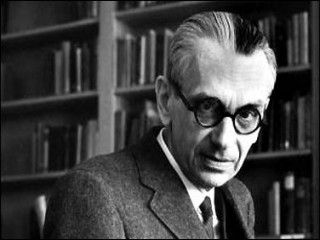
Kurt Gödel biography
Date of birth : 1906-04-28
Date of death : 1978-01-14
Birthplace : Brno, Czech Republic
Nationality : Czech
Category : Famous Figures
Last modified : 2010-05-20
Credited as : Mathematician and philosopher, Incompleteness Theorems, Albert Einstein
A known mathematical genius even before he received his doctorate at the age of 25, Kurt Gödel published his Incompleteness Theorems at the University of Vienna in 1931. Additionally, he came up with a system of working with proof theories that clarified the distinctions between different types of logic, namely modal logic versus classical logic.
Growing up, Kurt Gödel was always becoming one citizen or another because of the area of the world he lived in. He always claimed he was Austrian, even after the Czech Republic was formed. Even though he was gifted in languages from an early age, he refused to learn the new Czech tongue. He later became a German Citizen before the break out of World War II. While studying at the University of Vienna, he did not pay much attention to the politics of the day, but concentrated more on physics, philosophy, and mathematics.
As he went off to university, his family had always called him ‘Mr. Why’ because of his extreme curiosity in everything he experienced. Within six years, he had already earned a doctorate and within ten years, he had already published more mathematical marvels than any of his professors. His work was understood and possible for even the lesser mathematicians of the time. In essence, his work proved that some formulas are impossible to prove in a formal system of understanding. But, if one used another system of logic and labeling, then some of the theorems could be solved.
By the mid-1930s, Gödel had already been to the United States and often lectured at Princeton University. It was at Princeton that he became very good friends with Albert Einstein. In 1938, when Austria became a part of Germany, Gödel knew he was at the prime age and fitness for military service, so he escaped by railway and made it to Japan, where they then flew into San Francisco. With the influence and help of the universities where he worked and of his friend Einstein, Gödel was able to become a naturalized American citizen. Gödel would add to Einstein’s own theories and even came up with some points that showed that time travel would be possible if Einstein’s ideas of rotating universes were correct. Later in his career, he was awarded the Albert Einstein Award and the National Medal of Science. With his old age, paranoia got the best of him and he often believed there was a conspiracy to kill him. As a result, he died of malnutrition in a hospital.
















